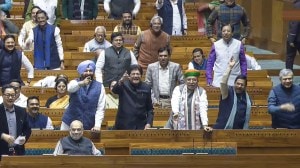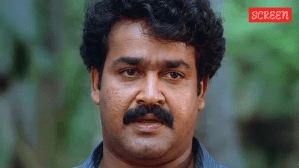Newsmaker: A S Dulat, the ‘spy’ who never left Kashmir
NC’s rage over his claim in a book regarding Farooq Abdullah brings together the two aspects of the former R&AW chief’s long career: his long engagement with Kashmir, and his longer friendships there
 Dulat’s stint in Kashmir lasted only two years, as he was sent back to Delhi following his differences with then J&K Governor Jagmohan.
Dulat’s stint in Kashmir lasted only two years, as he was sent back to Delhi following his differences with then J&K Governor Jagmohan. Nearly four decades after he had his first brush with Jammu and Kashmir as Joint Director, Intelligence Bureau, Amarjit Singh Dulat’s affair with the Valley continues.
And so it was that the former R&AW chief found himself again in the news after he claimed in his latest book The Chief Minister and The Spy that post the August 5, 2019, changes ushered in by the Modi government in J&K, National Conference chief Farooq Abdullah – though distraught at the abrogation of Article 370 – told him that the NC could have helped the Centre pass a legislation for the statute’s abolition had it been approached for the same.
Given the sensitivities in Kashmir over the issue, the NC, including Farooq, took immediate umbrage, rushing in to denounce Dulat. But this was just the kind of anecdote likely to fall out of 84-year-old Dulat’s closet, who is widely acknowledged within the security establishment as the “spy with a difference”, able to strike deep personal relationships despite the sensitive nature of his job.
By Dulat’s own admission, “Good spying, if I can call it that, comes down to maintaining dialogue, maintaining contacts and relationships. I don’t mean this in a transactional way.”
This certainly holds true when it comes to Kashmir, where Dulat was posted at the height of militancy in 1988. A 1965-batch IPS officer of the Rajasthan cadre, he joined the IB in 1969 and was subsequently absorbed into the agency. In the Valley, he got down to work doing what he knew best, talking, as he battled frayed tempers, raging resentments and blazing guns.
Officers and former colleagues recall him opening a dialogue with politicians, separatists, militants, anyone who was interested in knowing Delhi’s mind. “He was on a first-name basis with all the separatists now in jail,” remembers an IB officer who served in Kashmir.
It was during this time that he also struck a great rapport with Farooq Abdullah, who was the CM between 1986 and 1990.
Following the row over his book, Dulat told The Indian Express: “I would request Doctor Sahab (Farooq Abdullah) to read the book and not pay attention to controversies in the press. This book is an appreciation of Dr Farooq Abdullah and not his critique. And Doctor Sahab will always be my friend.”
Centre’s go-to man for Kashmir
Dulat’s stint in Kashmir lasted only two years, as he was sent back to Delhi following his differences with then J&K Governor Jagmohan. But the relations he built and the trust he developed among Kashmiris was enough for him to remain the go-to man of the Centre when it came to the Valley – across governments.
“Dulat was very hardworking. He had a soft approach for achieving his objectives, but he did achieve his objectives. Till today, no one has a better understanding of Kashmir than him,” remembers one of his subordinates in the IB who closely worked with him and is now retired.
After coming back from Srinagar, Dulat served on the J&K desk in Delhi and was instrumental in opening a channel between the government and separatists / militants.
As the Janata Dal made way for the return of the Congress at the Centre, Dulat was engaged by the government in the 90s to engage with Shabir Shah, then the poster boy of Kashmir separatism. As per sources, Dulat even offered Shah chief ministership in order to bring him to the mainstream, the same as he offered to other separatists, including Hurriyat leaders.
In his book The Chief Minister and the Spy – his third – Dulat claims it was he who convinced Abdullah to come back from London and contest the 1996 elections that the NC won by a landslide. They were the first elections following the rise of militancy in Kashmir, and played a big role in releasing the pressure in the Valley and allowing for peace.
An officer who served in Kashmir at the time says: “Dulat had a way of engaging with people. Probably, it was the empathy that he exuded. He somehow won the trust of all the people he met. He made promises that he was not sure Delhi would keep, but they believed him. Many of those promises, such as grant of greater autonomy to Kashmir, were never actually kept.”
Another officer says that not only did Dulat win the confidence of separatists, he also got Delhi to open its purse-strings and offer monetary incentives and concessions to them. This was one way, sources point out, of “compromising” the separatists and weakening their position.
“Dulat was the right man for that time. He looked at the larger picture. There was complete institutional collapse in Kashmir at that time, and the security forces were trying to recover ground. Parallely, Dulat worked on the separatists. And, with his guile, managed to compromise all of them. He succeeded in dividing them. That was his success,” as per an IB officer who has served in Kashmir.
A former director general of the J&K Police also talks of how effective Dulat was in this approach. “He was above stomping on foot. He would go for the head and split organisations. He engaged in high-level operations that made little noise. No one can associate a single encounter with him. He was not a scorekeeper,” the officer says.
He draws a comparison with Ajit Doval, the Modi government’s National Security Advisor and another old Kashmir hand. “Doval goes for destruction of organisations. Dulat is all about dismantling the ideology. Both are complimentary and have helped diminish militancy in Kashmir,” the officer says.
It were his successes in Kashmir which catapulted Dulat to the post of R&AW chief in 1999 – under the Atal Bihari Vajpayee government – from where he retired the next year. During this time too, he sustained his ties with Kashmir.
“Dulat was instrumental in splitting the Hizbul Mujahideen. He got the Hizbul’s Majid Dar to return to India, announce a ceasefire and enter into dialogue with Delhi. Nothing was achieved, but the Hizb was split and Dar was subsequently killed by militants,” an officer points out.
During the IC-814 hijacking in December 1999, Dulat’s proximity to Farooq Abdullah came in handy. Abdullah was reluctant to yield to the hijackers’ demand to release three militants for them to free passengers of the hijacked Air India flight. Dulat reportedly convinced Andullah to do it in national interest.
However, Dulat’s interest in Kashmir did lead to some tension with his previous organisation, the IB. “While all officers dealing with Kashmir looked up to him, the IB did not like Dulat continuing to engage with Kashmir as it was the IB’s domain. Even when he was the R&AW chief, all Kashmiri leaders and separatists would come and meet him alone,” an officer says.
His strength, his weakness
After he retired, the Vajpayee government, which was keen to resolve the Kashmir issue, retained Dulat as an advisor. He served in that position until the Vajpayee government fell in 2004, during the course of which the BJP Prime Minister made a historic bus trip to Lahore and promised “Jamhooriyat, Kashmiriyat and Insaaniyat” at a speech in the Valley.
Dulat continues to remain a votary of dialogue with Pakistan, and went on to even co-author a book with former ISI chief Asad Durrani.
However, if Dulat’s focus on Kashmir was his strength, it was also his weakness. “He never worked deeply on anything except the Valley,” a security establishment officer points out. Most officers that The Indian Express spoke to couldn’t remember any other achievement of Dulat.
An intelligence officer says: “His soft approach on the Kashmir issue also had its limitations. Conflicts are not resolved merely by dangling the carrot. But Dulat did not know or was never in favour of wielding the stick.”
The officer mentions the Balakot strikes by India following the strike in Pulwama. “That had a sobering impact on Pakistan. Only when you wield the stick does the carrot look attractive,” the officer says.
There may also be a personal reason Dulat could not tear himself from Kashmir. Dulat’s grandfather Gurdial Singh Dulat was the assistant administrator of the regency of Nabha in Punjab. His father Shamsher Singh, who grew up in pre-independence Lahore, studied at the University of Cambridge and went on to become an Indian Civil Service officer in British India. His aunt Jaswant Kaur was married into Patiala royalty while his father’s cousin Sardar Gian Singh Rarewala was the first chief minister of East Punjab States Union.
Dulat’s father went on to become a sessions judge and was posted in Sialkot when Dulat was born in 1940. A young Dulat witnessed the violence of Partition – his uncle was killed by his Muslim staff – after which his family shifted to Delhi.
Dulat, who went to Bishop Cotton School in Shimla and graduated from Punjab University, also faced a threat to his life during the anti-Sikh riots of 1984. In one of his books, he describes that while travelling from Delhi to Bhopal, his train was forcibly stopped by rioters. While Dulat escaped unhurt, two passengers were killed.
It was the moment, Dulat writes, that he for the first time saw himself as a Sikh. “Until all this had happened, I never thought of myself as anything but an Indian.”
- 01
- 02
- 03
- 04
- 05































